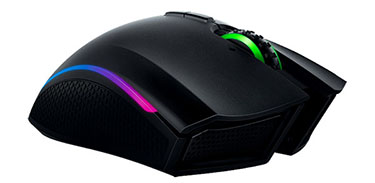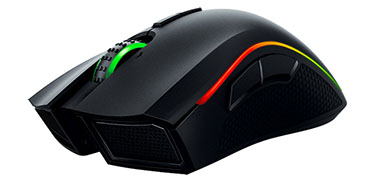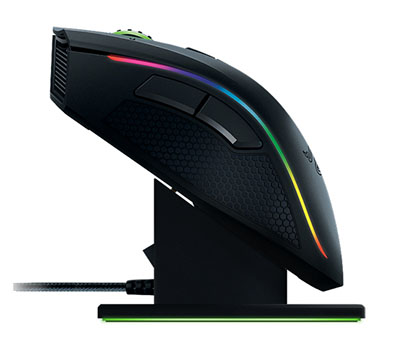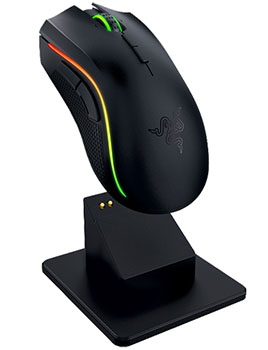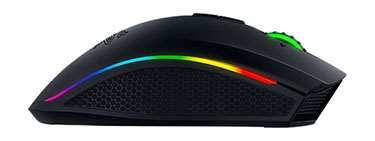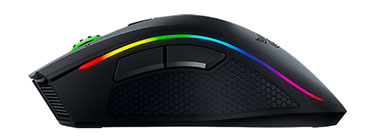Introduction
The world's most advanced gaming mouse is how Razer describes the Mamba 2015 wireless. A case of marketing hyperbole, perhaps, or is this the real deal as far as gamers are concerned?
The Mamba 2015 is the latest-generation Razer mouse that liberally harvests much of the technology also found in this year's corded Tournament Edition. This means it uses the same super-high 16,000 DPI sensor produced by Philips on which Razer holds exclusivity for the next year or so.
Why so high, you may ask? Razer believes that stratospheric DPIs are necessary for gamers indulging their thrills and spills at 4K resolutions or high-pixel multi-monitor setups. The new sensor also supports genuine single-DPI intervals rather than the increments of 50 found on most current gaming mice. Good on you if you can tell the difference between, say, 8,367DPI and 8,368DPI.
It's no surprise that the Mamba (wireless) and Mamba Tournament Edition (corded) look and feel identical. The fit and finish are excellent though do be aware that, catering for the majority, the 125g mouse is designed for right-handed users. It sits reasonably well for cack-handed users like yours truly but mass-market ergonomics ensure it's never a perfect fit: we wish Razer would make one for us lefties.
Mamba uses an ever-so-slight rough finish to aid grippyness up top. The sides and scroll bar each have a more pronounced textured finish. Allied to the three Teflon-coated feet on the bottom, fast movements are precise and comfortable for extended gaming periods. Comfort is a subjective qualification, but everyone who used the Mamba in the office came away impressed with how well the mouse fitted into various hand sizes. And so it should, because £135 is a heck of an outlay for a peripheral.
Mamba is supplied with a charging dock that tilts the mouse at a 45-degree angle. A 2.1m cable runs off to a standard USB port on the front, though should you so wish, the same dock-side cable can also be connected directly to the front of the mouse via small recessed micro-USB port. In this mode, the Mamba becomes a pseudo Tournament Edition mouse.
But being corded isn't how this Mamba should be used. Razer reckons that a fully-charged mouse is good for 20 hours of gaming, up from eight hours on previous Mamba mice. The battery isn't user-replaceable, mind, though common sense dictates that it should last a long while before failing to dish up adequate charge. Razer also contends the wireless version to have a 1ms response time, or a standard 1,000Hz polling rate commensurate with the corded version.
Mamba, however, has a neat trick up its sleeve not available to the corded Tournament Edition. On the underside is the Adjustable Click Force Technology which, as the name suggests, enables the two primary buttons to adjust the amount of force needed to actuate clicks. Each button's force is controlled by a separate Allen-headed screw on the bottom.
Turning the supplied Allen key through 15 click settings - 504° in total - increases the actuation force from 45g to 95g in fairly even steps, with the lighter button presses more suited to fast-clicking Moba and RTS gaming while heavier presses make sense for FPS gaming where each click needs to be distinct. The technology makes implicit sense, we suppose, but there's no clear, obvious way in knowing the weight each button is set to. Perhaps Razer needs a small visual indicator on the screws?
Keeping it modern, the Chroma RGB lighting spans the scroll wheel, all around the main body and even all four sides of the dock. Interestingly, unlike the corded model, the Razer logo is not illuminated. In total, the Mamba has 16 individual LEDs that can be configured using the provided settings in the Synapse software or tweaked in more advanced ways by using the Chroma SDK. The lighting spans five distinct modes - spectrum cycling, breathing, static, reactive and wave.
Mamba ploughs a wide furrow by catering to Moba/FPS/RTS players, so read on to find out if it's all things to all gamers.






